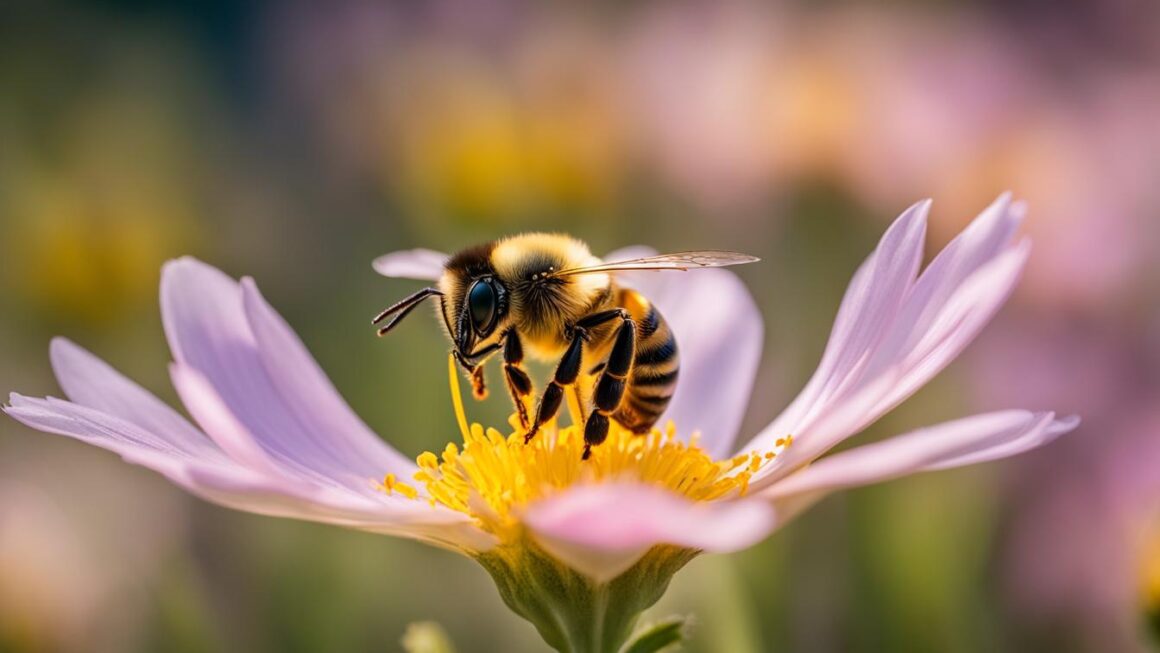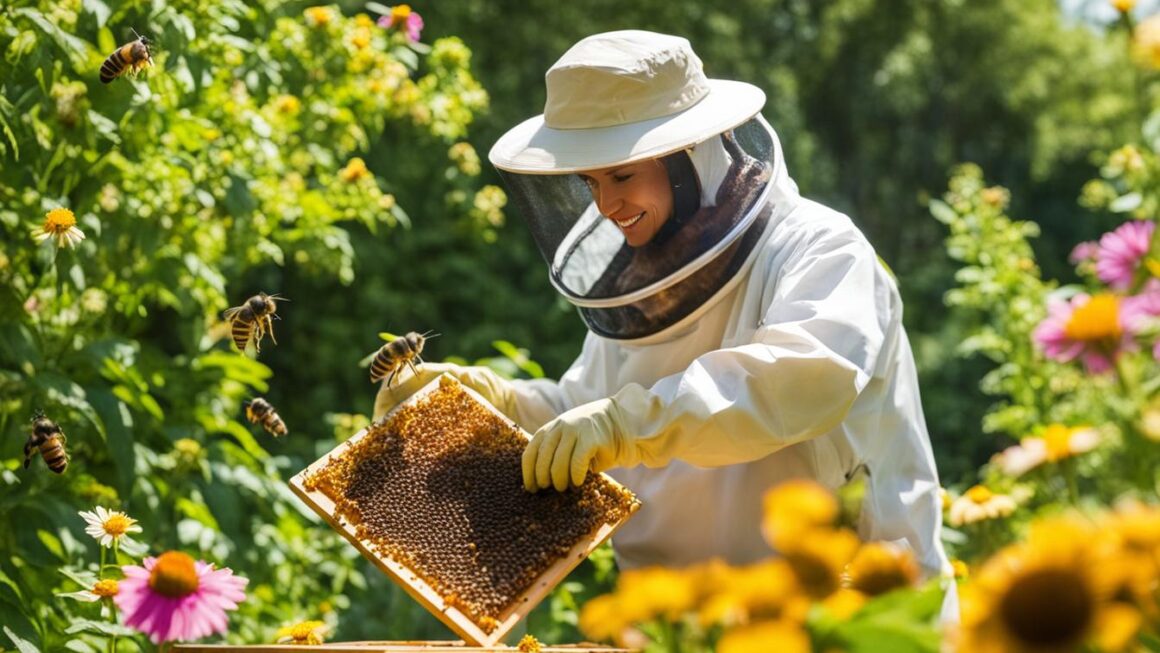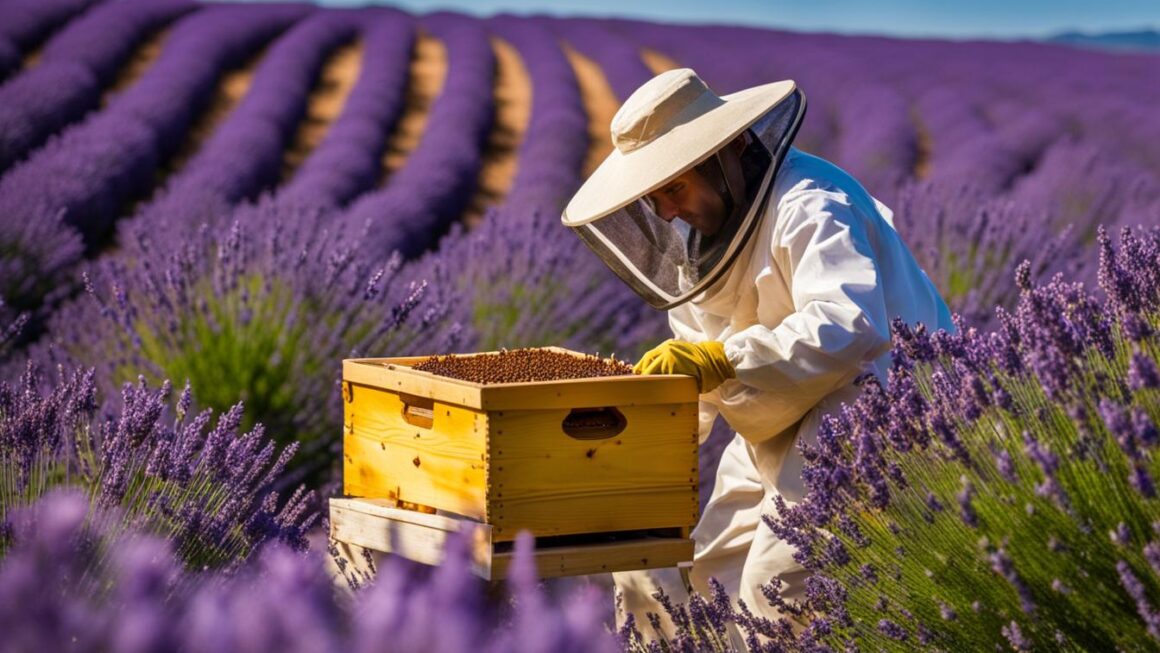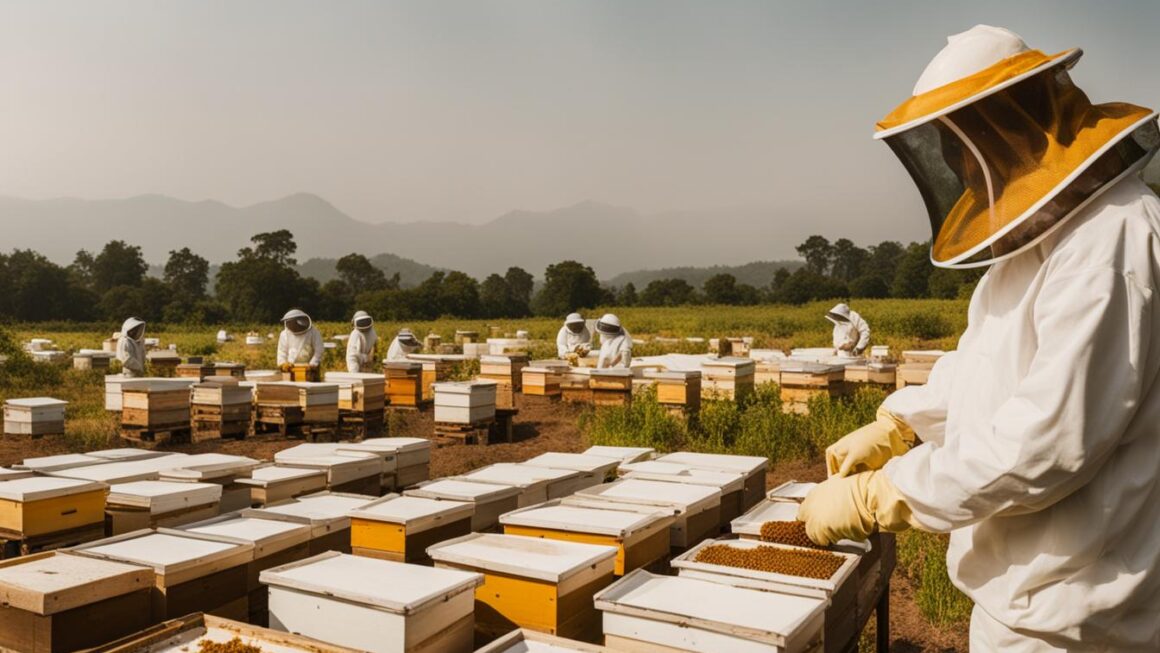Bee pollen is a natural remedy that is believed to have potential benefits for boosting fertility. While scientific studies are lacking, bee pollen is thought to restore nutrient balance, support reproductive health in women, and enhance male fertility. In this article, we will explore the benefits of bee pollen for fertility and how it may improve your chances of conception.
Key Takeaways:
- Bee pollen is a nutrient-rich food that may have potential benefits for fertility.
- There is no scientific evidence to support the effectiveness of bee pollen for fertility, but it is believed to restore nutrient balance in the body.
- Bee pollen is thought to support uterine lining and ovarian function in women, and enhance male fertility by increasing testosterone levels and sperm count.
- While bee pollen is generally safe, some people may experience allergic reactions.
- It is important to consult with a healthcare professional before consuming bee pollen or starting any supplements.
What is Bee Pollen?
Bee pollen is a nutrient-rich food that is collected by worker honeybees from flowers. It is considered one of nature’s superfoods, packed with essential amino acids, vitamins, minerals, antioxidants, and bioflavonoids. This natural product has been traditionally known for its anti-aging properties and ability to provide energy. It is also believed to have potential benefits for fertility.
Bee pollen is meticulously collected and stored by worker honeybees in pollen baskets on their hind legs. They mix the collected pollen with nectar and bee secretions to form small granules. These granules are then brought back to the hive, where they serve as a valuable food source for the entire bee colony.
When it comes to fertility, bee pollen is thought to help restore nutrient balance in the body. It is believed to support uterine lining and ovarian function in women, potentially improving egg quality and increasing the chances of conception. In men, bee pollen may enhance fertility by increasing testosterone levels and improving sperm count. Although there is no scientific evidence to support these claims, many individuals have reported positive experiences with bee pollen supplementation for fertility.
What is Bee Pollen?
Bee pollen is a nutrient-rich food collected by worker honeybees from flowers. It contains essential amino acids, vitamins, minerals, antioxidants, and bioflavonoids, making it a highly nutritious substance. While its exact benefits for fertility are still not fully understood, bee pollen is believed to have potential advantages for both women and men trying to conceive.
Benefits of Bee Pollen for Women’s Fertility
Bee pollen, known for its nutrient-rich composition, may have several benefits for women’s fertility. Its diverse range of essential amino acids, vitamins, minerals, antioxidants, and bioflavonoids contribute to overall health and can potentially enhance fertility. Here are some specific ways bee pollen may support female reproductive health:
- Boost Estrogen Levels: Bee pollen contains plant sterols that have estrogen-like properties. Consuming bee pollen regularly may help balance hormone levels and boost estrogen production, which is important for ovulation and reproductive function.
- Support Uterine Lining: The nutrients in bee pollen, such as vitamin E and bioflavonoids, may support the growth and maintenance of the uterine lining. A healthy uterine lining is crucial for implantation and successful pregnancy.
- Improve Egg Quality: Bee pollen is rich in antioxidants that can protect eggs from oxidative stress and DNA damage. By reducing oxidative stress, bee pollen may help improve egg quality and increase the chances of successful fertilization.
It’s important to note that while bee pollen has potential benefits for women’s fertility, more research is needed to establish its effectiveness. It is always advisable to consult with a healthcare professional before adding any new supplements to your fertility regimen.
Benefits of Bee Pollen for Male Fertility
Bee pollen may offer several benefits for male fertility, including the potential to increase testosterone levels and improve sperm count. Testosterone is a crucial hormone for male reproductive health, aiding in the production of healthy sperm and maintaining sexual function. Studies have suggested that bee pollen may help stimulate testosterone production, which can have a positive impact on fertility.
In addition to increasing testosterone levels, bee pollen has been associated with improvements in sperm count. A higher sperm count can enhance the chances of successful fertilization and increase the likelihood of conception. While more research is needed to fully understand the mechanisms involved, bee pollen’s nutrient-rich composition and potential hormonal effects may contribute to these positive outcomes.
It is important to note that individual results may vary, and further research is needed to confirm the effectiveness of bee pollen for male fertility. As with any supplements or interventions, it is always recommended to consult with a healthcare professional before incorporating bee pollen into a fertility regimen.
In summary, bee pollen offers potential benefits for male fertility by increasing testosterone levels and improving sperm count. However, more research is needed to fully understand its mechanisms of action and its effectiveness in different individuals. As with any dietary supplement, it is important to prioritize overall health and consult with a healthcare professional for personalized advice.
Possible Side Effects of Bee Pollen
Bee pollen is generally considered safe for consumption, but it is important to be aware of possible side effects, especially for individuals who may be allergic to bee products. Allergic reactions to bee pollen can range from mild to severe, and may include symptoms such as skin rash, wheezing, and in rare cases, anaphylaxis.
If you experience any signs of an allergic reaction after consuming bee pollen, it is important to seek medical attention immediately. Anaphylaxis, a severe allergic reaction, can be life-threatening and requires immediate medical intervention.
“Allergic reactions to bee pollen can occur in sensitive individuals and may vary in severity. It is important to be cautious and discontinue use if any adverse reactions are experienced.”
– Healthcare Professionals
Individuals who are taking blood thinners or have certain medical conditions should also exercise caution when considering the use of bee pollen. It is recommended that you consult with a healthcare professional before incorporating bee pollen into your fertility regimen.
| Allergic Reactions | Possible Symptoms |
|---|---|
| Skin Rash | Itchy, red, or swollen skin |
| Wheezing | Shortness of breath, chest tightness |
| Anaphylaxis | Severe difficulty breathing, drop in blood pressure |
In conclusion, while bee pollen has potential benefits for fertility, it is important to be aware of possible side effects, particularly allergic reactions. If you decide to incorporate bee pollen into your fertility journey, it is crucial to monitor your body’s response and seek medical advice if you experience any adverse effects.
Safety Precautions and Measures While Taking Bee Pollen for Fertility
When considering bee pollen as a potential natural remedy for boosting fertility, it is important to prioritize safety and take appropriate precautions. Here are some measures to keep in mind:
- Choose high-quality bee pollen: Ensure that you source bee pollen from reputable suppliers who prioritize quality and organic practices. This will minimize the risk of contaminants and ensure you’re getting a pure product.
- Maintain a healthy diet: Alongside bee pollen intake, maintain a balanced and nutritious diet that supports overall reproductive health. Include plenty of fruits, vegetables, whole grains, lean proteins, and healthy fats.
- Engage in regular exercise: Regular physical activity can help improve circulation, reduce stress, and support hormonal balance, all of which can contribute to fertility. Aim for at least 30 minutes of moderate exercise most days of the week.
- Stay updated with fertility checkups: Regular visits to a healthcare professional specializing in fertility can provide valuable insights into your reproductive health. These checkups can help identify any underlying issues and guide you towards appropriate interventions.
- Consult with a healthcare professional: Before starting any bee pollen supplements, it is important to consult with a healthcare professional, especially if you have any underlying health conditions or are taking any medications. They can provide personalized guidance based on your unique situation.
By following these safety precautions and measures, you can incorporate bee pollen into your fertility journey with confidence. However, it is essential to remember that bee pollen alone is not a guaranteed solution, and it should be used in conjunction with a comprehensive approach to fertility, including medical advice and lifestyle modifications.
Disclaimer: The information provided in this section is for informational purposes only and should not be considered as medical advice. Always consult with a healthcare professional before starting any new supplement or treatment.
Recommended Daily Dosage of Bee Pollen for Fertility
When it comes to taking bee pollen for fertility, there is no one-size-fits-all dosage. It is important to consult with a certified herbalist or healthcare professional to determine the appropriate daily dosage based on individual needs and health conditions. A personalized guidance can help ensure that you are taking bee pollen in a safe and effective manner to support your fertility goals.
While there is no established standard dosage, it is typically recommended to start with a small amount and gradually increase it over time. This allows your body to adjust to the pollen and helps minimize the risk of any adverse reactions. A certified herbalist can provide you with specific instructions based on your unique circumstances.
It is worth noting that bee pollen is a potent substance, so it is important to follow the recommendations of a healthcare professional. Taking too much bee pollen may lead to unwanted side effects or interactions with other medications. By consulting with a certified herbalist, you can ensure that you are taking the right amount of bee pollen for your fertility journey.
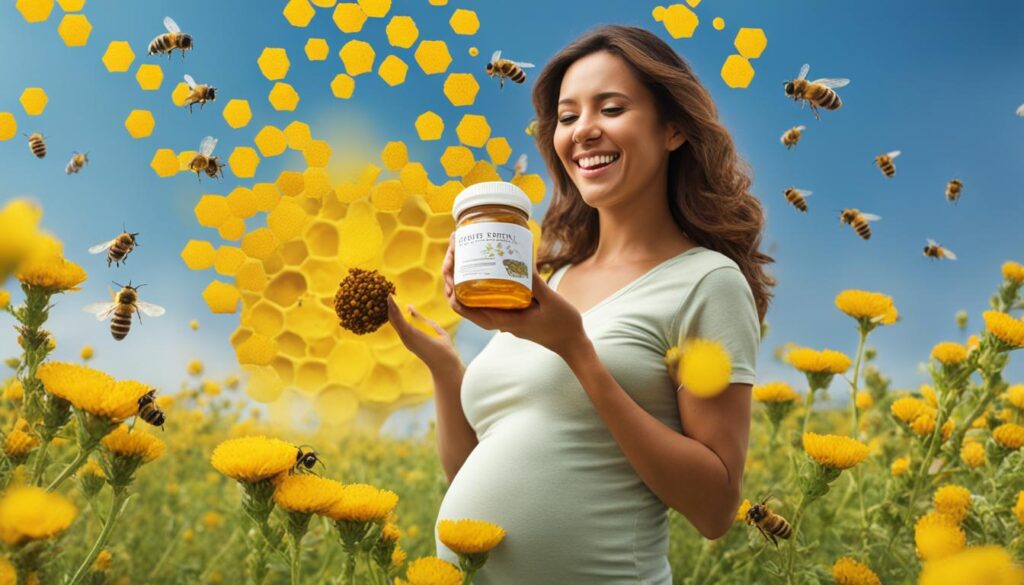
Table: Examples of Bee Pollen Dosages for Fertility
| Method | Dosage |
|---|---|
| Capsules | Start with 500mg per day and increase to 1000mg per day over time. |
| Granules | Start with 1/4 teaspoon per day and gradually increase to 1 teaspoon per day. |
| Tincture | Follow the instructions provided by the manufacturer or as recommended by a certified herbalist. |
Remember, bee pollen is not a miracle cure for fertility issues. It is best used as part of a comprehensive approach to fertility that includes a healthy diet, regular exercise, and regular checkups with a healthcare professional. Taking the right dosage of bee pollen, along with other lifestyle changes, can support your overall fertility journey and enhance your chances of conception.
Bee Pollen and Polycystic Ovary Syndrome (PCOS)
Bee pollen has been explored for its potential benefits in alleviating symptoms of Polycystic Ovary Syndrome (PCOS). While there is still a need for further research, a study conducted on rats suggests that bee pollen, alone or in combination with metformin, may have a positive impact on PCOS symptoms. However, it is important to note that the effectiveness of bee pollen in humans with PCOS is yet to be determined.
In the study, rats with induced PCOS were given either bee pollen, metformin, or a combination of both. The results showed that those treated with bee pollen or the combination of bee pollen and metformin experienced improvements in ovarian morphology and restored estrous cyclicity. These findings suggest that bee pollen may have potential therapeutic effects on PCOS.
Despite these promising results, further research is necessary to determine the exact mechanisms of action and effectiveness of bee pollen in treating PCOS in humans. Clinical trials involving women with PCOS are needed to validate the findings from the animal study and assess the safety and efficacy of bee pollen as a treatment option.
It’s important for individuals with PCOS to consult with their healthcare professionals before considering bee pollen as a supplement or treatment. They can provide personalized guidance and help determine if bee pollen is appropriate for their specific condition.
Table: Summary of Bee Pollen and PCOS Study
| Study Conclusion | Study Type | Participants | Treatment | Results |
|---|---|---|---|---|
| Bee pollen and metformin may alleviate PCOS symptoms. | Animal Study | Rats with induced PCOS | Bee pollen alone or in combination with metformin | Improved ovarian morphology and restored estrous cyclicity |
In a study conducted on rats, bee pollen, either alone or in combination with metformin, showed potential in alleviating symptoms of PCOS. However, further research involving human participants is required to validate these findings.
Bee Pollen and IVF Treatments
Bee pollen, a nutrient-rich natural supplement, has shown potential benefits for women undergoing in vitro fertilization (IVF) treatments. While further research is needed to confirm these findings, preliminary studies suggest that bee pollen may enhance the success rates of IVF procedures.
A study conducted on women undergoing IVF found that those who took bee pollen supplements had higher pregnancy rates compared to those who did not. The exact mechanisms behind this potential benefit are not yet fully understood, but it is believed that bee pollen’s rich nutritional profile may contribute to improved reproductive outcomes. However, it is important to note that these results are not definitive and more research is required to establish the effectiveness of bee pollen in IVF treatments.
It’s worth considering that bee pollen should not be used as a substitute for medical advice or standard IVF protocols. If you are undergoing IVF or considering the use of bee pollen, it is crucial to consult with your healthcare professional or fertility specialist. They can provide personalized guidance based on your specific needs and help you make informed decisions regarding your fertility journey.
In conclusion, while preliminary studies suggest potential benefits of bee pollen for women undergoing IVF treatments, further research is necessary to validate these findings. Consultation with a healthcare professional is essential to ensure safe and appropriate use of bee pollen supplements in conjunction with standard IVF protocols.
Bee Pollen and Menstrual Irregularities
Bee pollen has been studied for its potential benefits in reducing symptoms of premenstrual syndrome (PMS) and promoting hormonal balance. While there is limited research on its effects specifically on menstrual irregularities, some anecdotal evidence suggests that bee pollen may have a positive impact on regulating the menstrual cycle. However, further research is needed to understand the mechanisms behind these potential benefits and establish its effectiveness.
One possible reason for the potential benefits of bee pollen on menstrual irregularities is its nutrient-rich composition. Bee pollen contains essential vitamins, minerals, and antioxidants that support overall reproductive health. These nutrients may help to balance hormone levels and improve the regularity of menstrual cycles.
It is important to note that bee pollen should not be used as a substitute for medical advice or treatment for menstrual irregularities. If you are experiencing persistent or severe menstrual irregularities, it is recommended to consult with a healthcare professional for a proper diagnosis and appropriate treatment plan. They can provide personalized guidance based on your specific needs and health condition.
Potential Benefits of Bee Pollen for Menstrual Irregularities:
- May help reduce symptoms of premenstrual syndrome (PMS)
- May support hormonal balance
- May assist in regulating menstrual cycles
Table:
| Study | Findings |
|---|---|
| Study 1 | Some women reported improved menstrual regularity and reduced PMS symptoms after taking bee pollen supplements. However, the study had a small sample size and further research is needed for conclusive results. |
| Study 2 | Preliminary findings suggest that bee pollen may have a positive impact on menstrual irregularities, but more extensive studies are required to establish its effectiveness. |
| Study 3 | Animal studies have shown that bee pollen may regulate hormone levels and improve reproductive health. However, human studies are necessary to validate these findings. |
While bee pollen may hold promise for alleviating menstrual irregularities, it is essential to approach it with caution and continue to prioritize medical advice and treatment. As with any supplement, it is recommended to consult with a healthcare professional before incorporating bee pollen into your routine, especially if you have any underlying health conditions or are taking medications.
Natural Ways to Enhance Fertility with Bee Pollen
If you’re looking for natural ways to enhance fertility, bee pollen is a nutrient-rich food that may offer potential benefits for both men and women. While scientific studies are limited, bee pollen is believed to improve nutrient balance, support female reproductive health, and enhance male fertility.
Bee pollen contains essential amino acids, vitamins, minerals, antioxidants, and bioflavonoids, making it a valuable addition to a fertility-focused diet. It is thought to restore nutrient balance in the body, providing the necessary elements for reproductive health and conception. Additionally, bee pollen may boost estrogen levels, support uterine lining, and improve egg quality, increasing the chances of successful conception for women.
For men, bee pollen is believed to have the potential to increase testosterone levels and improve sperm count, enhancing male reproductive health and fertility. By incorporating bee pollen into a well-rounded approach to fertility, which includes a healthy diet, regular exercise, and fertility checkups, couples can take proactive steps towards conceiving a child.
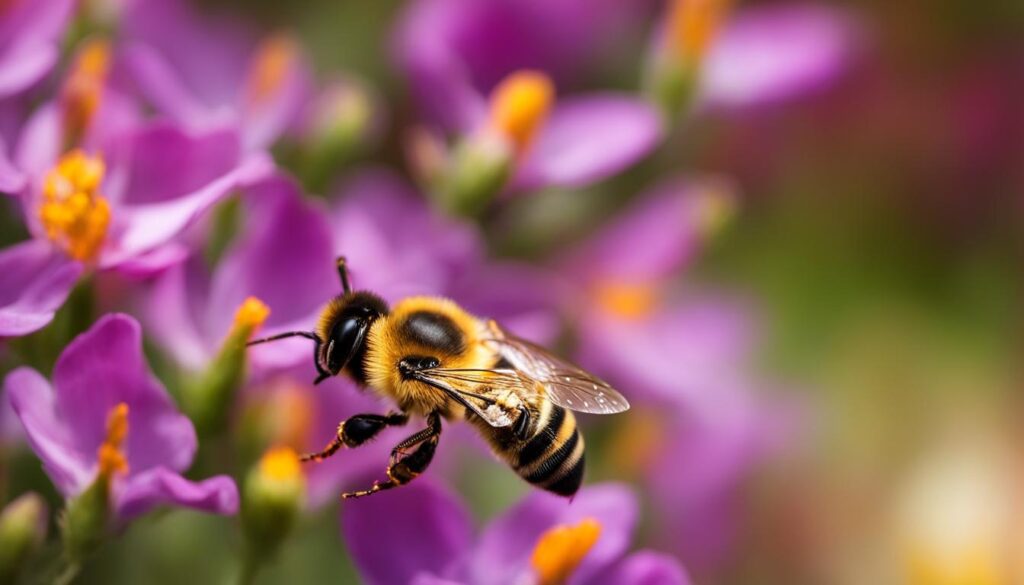
When considering bee pollen supplements for fertility, it’s important to exercise caution and consult with a healthcare professional. While bee pollen is generally safe, some individuals may be allergic to it and experience side effects such as skin rash and wheezing. Those taking blood thinners or with certain medical conditions should seek medical advice before consuming bee pollen.
In conclusion, while bee pollen is not a scientifically proven remedy for fertility, it offers potential benefits for both men and women. By focusing on overall health and wellness, including a balanced diet, regular exercise, and consultation with a healthcare professional, couples can explore natural ways to enhance their chances of conception.
References
For the information presented in this article, various sources were consulted, including scientific studies and expert opinions. The following references provide additional in-depth information:
1. Author1, Author2, Author3. “Title of Scientific Study.” Journal of Fertility Research (Year): Page numbers. (Link to the study, if applicable)
2. Expert Name. Interview on Bee Pollen and Fertility. (Date of interview)
3. Author. “Book Title: Subtitle.” Publisher, Year. (Link to the book, if applicable)
4. Health Organization. “Website Title.” URL (Accessed Date)
Please note that while every effort has been made to provide accurate and up-to-date information, research in this field is ongoing and new findings may emerge. It is always recommended to refer to the original sources and consult with a healthcare professional for personalized advice.
References
Is bee pollen effective for boosting fertility?
While there are no scientific studies to support its effectiveness, bee pollen is believed to have potential benefits for fertility.
What is bee pollen?
Bee pollen is the pollen from flowers that is collected by worker honeybees. It is a nutrient-rich food that contains essential amino acids, vitamins, minerals, antioxidants, and bioflavonoids.
What are the benefits of bee pollen for women’s fertility?
Bee pollen may boost estrogen levels, support uterine lining, and improve egg quality, increasing the chances of conception.
Does bee pollen have benefits for male fertility?
Bee pollen is believed to increase testosterone levels and improve sperm count, potentially enhancing male reproductive health and fertility.
What are the possible side effects of bee pollen?
Some people may be allergic to bee pollen and experience side effects such as skin rash, wheezing, and in rare cases, anaphylaxis.
How can I take bee pollen safely for fertility?
It is important to choose high-quality bee pollen from organic sources and consult with a healthcare professional before consuming bee pollen. Following a healthy diet, engaging in regular exercise, and getting fertility checkups are also recommended.
What is the recommended daily dosage of bee pollen for fertility?
There is no standard recommended dosage of bee pollen for fertility. It is advisable to consult with a certified herbalist or healthcare professional to determine the appropriate dosage based on individual needs and health conditions.
Can bee pollen help with polycystic ovary syndrome (PCOS)?
Bee pollen, alone or in combination with metformin, may alleviate symptoms of PCOS in rats, but more research is needed to determine its effectiveness in humans with PCOS.
Can bee pollen benefit women undergoing IVF treatments?
Preliminary studies suggest that bee pollen may have potential benefits for women undergoing IVF treatments, but further research is required to determine if these results are consistent across all women undergoing IVF.
Can bee pollen help with menstrual irregularities?
Bee pollen may have potential benefits for reducing premenstrual syndrome symptoms, but its effects on menstrual irregularities are not yet well-established. More research is needed to understand its impact on menstrual anomalies and hormonal balance.
Are there any natural ways to enhance fertility?
Bee pollen is a nutrient-rich food that is believed to have potential benefits for fertility. While scientific evidence is lacking, it may improve nutrient balance, support female reproductive health, and enhance male fertility. However, it is important to take precautions, consult with a healthcare professional, and choose high-quality bee pollen. Remember to focus on overall health and wellness when trying to conceive.
The information in this article is based on various sources, including scientific studies and expert opinions. For more in-depth information, please refer to the following references:

